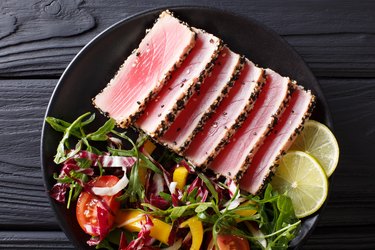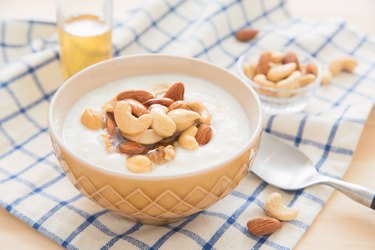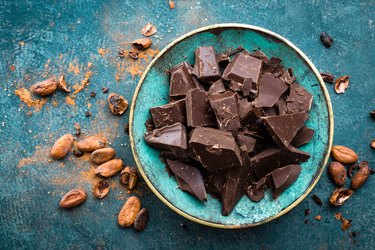10 Anti-Inflammatory Foods to Add to Your Diet

You've likely heard a lot about chronic inflammation lately and how it contributes to cellular damage, disease and premature aging. But making healthy lifestyle choices — like eating plenty of fruits, vegetables and other foods with anti-inflammatory properties — can help keep it from becoming a serious health risk.
What Is Inflammation?
Everyone needs some inflammation in their bodies, reports Harvard Health Publishing. When your immune system detects an injury or a foreign substance (like bacteria or a virus, for example), it triggers an inflammatory response that sends blood cells rushing to the affected area. That's called acute inflammation, which causes symptoms like redness and swelling, and it helps the body to heal and repair.
But chronic, low-level inflammation is something different. It's a sign that the body's immune system is overreacting, and it's been linked to numerous health problems. For example, inflammation causes joint pain and stiffness for people with the autoimmune disease rheumatoid arthritis, says Matthew Black, RD, a nutritionist at Ohio State University Wexner Medical Center.
"But even for people without autoimmune disease, there's also inflammation on a cellular level that we're not aware of on a daily basis," Black adds. "Even though we can't see or feel it, that inflammation can contribute to things like heart disease down the road."
Chronic inflammation is measured by proteins in the blood or saliva, called cytokines, that are produced when the body is in an inflammatory state. These cytokines — which include interleukin-6 (IL-6) and C-reactive protein (CRP) — help doctors understand what's going on in the body, so they're also known as inflammatory markers.
Many things contribute to chronic inflammation, including genetics and lifestyle choices like smoking and lack of physical activity. But diet plays a large role, as well. "Processed foods, enriched flour and hydrogenated oils — also known as trans fats — have all been linked to an increase in inflammatory markers," says Black.
"Getting these foods out of your diet, and focusing more on whole foods and plant-based foods, are some of the best things you can do," says Black.
Foods That Fight Inflammation
In that spirit, here are 10 foods that have been shown to fight inflammation in the body, along with smart ways to incorporate them into your diet.
1. Oily Fish
Fish are a good source of omega-3 fatty acids, a type of monounsaturated fat that has been shown to slow the production of inflammatory proteins, according to the Cleveland Clinic. Plus, says Black, adding more fish to your diet can help you eat less red meat, which is high in saturated fat and may fuel inflammation.
The American Heart Association recommends eating fish at least two times per week. (Children and pregnant women, however, should choose fish low in mercury.) For the most omega-3s per serving, opt for oily or fatty fish. "Salmon is probably the most popular choice that people think of most often," says Black, "but other good options are mackerel, sardines and tuna."
Read more: 7 Fish Recipes That Are Great for Your Heart
2. Cinnamon
Using cinnamon in food or drink recipes does more than add a warming, feel-good spice; it may also increase the inflammation-fighting effects of whatever you're making.
According to a 2014 review in the journal Evidence-Based Complementary and Alternative Medicine, cinnamon contains several chemical compounds, known as flavonoids, that have anti-inflammatory properties. And in May 2018, a small study in the Journal of the American College of Nutrition found that women with rheumatoid arthritis who took cinnamon supplements for eight weeks experienced a greater reduction in inflammatory markers in their blood — as well as less pain and swelling — than those who took a placebo. So go ahead and sprinkle a bit of the spice onto your morning oatmeal.

3. Yogurt
Dairy isn't always considered an anti-inflammatory food group. Studies have been inconsistent, as an August 2017 report in Critical Reviews in Food Science and Nutrition points out: Some have found that milk and cheese consumption increase markers of inflammation in the body, while other research suggests that some dairy products have anti-inflammatory benefits.
But yogurt — a fermented dairy product that contains live bacterial cultures — seems to be worth including in an anti-inflammatory diet. A June 2018 study in the Journal of Nutrition found that low-fat yogurt helps bolster the lining of the intestines, which can prevent inflammatory cytokines in the gut from entering the bloodstream after high-calorie or high-fat meals.
The Dietary Guidelines for Americans state that low-fat dairy products, including yogurt, can fit into a healthy eating pattern, the study authors point out — and their research supports this recommendation. But they also note that sweetened yogurt can be high in added sugar, which should be limited to no more than 10 percent of one's daily calories.
Recipe: Cashew Maple Yogurt
4. Dark Leafy Greens
You already know that spinach, kale and broccoli are good for you. You may not know, however, that they contain high levels of lutein — a chemicals that researchers suspect helps fight chronic inflammation in the body.
In a 2017 study in the journal Atherosclerosis, scientists looked at levels of six different plant-based compounds, called carotenoids, in the blood of patients with coronary artery disease. They found that lutien was the only one that corresponded with the inflammatory marker IL-6: The higher a person's lutien levels, the lower their IL-6 levels.
Then, the scientists collected immune cells from those patients and experimented with them in a laboratory setting. Sure enough, they found that treating the cells with lutein lowered their inflammatory activity.
Studies have not yet confirmed whether lutein from food sources (like dark leafy greens) has the same effect on cells — but there are plenty of other reasons to eat these foods, regardless. "We know they're low in calories and high in antioxidants already," Black says, "and if they turn out to be anti-inflammatory as well, that's another bonus."
5. Whole Grains
Foods that are high in fiber help fight inflammation, says Black, because they feed beneficial bacteria living in the gut and help rid the body of unhealthy cholesterol. Eating a fiber-rich diet can also help you lose weight or maintain a healthy weight, he adds, which can also keep inflammation at bay.
"One of the best ways to boost fiber in your diet is to eat more whole grains, like brown rice and whole-wheat bread and pasta," says Black. Compared to white bread and other refined grains — which break down rapidly in the body and quickly turn to sugar, which fuels inflammation — whole grains take longer to digest and help keep blood sugar levels stable.
Whole grains also contain compounds such as vitamins B and E, zinc and selenium, according to an October 2018 review in Medicine, which may also contribute to their anti-inflammatory powers.
Read more: 13 Powerful Grains and Seeds

6. Grapes
Red and black grapes contain resveratrol, a chemical compound that's been shown to have similar effects on cells as anti-inflammatory drugs like aspirin, notes the Arthritis Foundation.
But it's likely the combination of many different compounds in grapes that account for their full range of anti-inflammatory and health-boosting properties, according to a 2015 August report in the Annals of the New York Academy of Sciences. Therefore, those authors concluded, it's likely more beneficial to consume whole grapes and whole-grape products (like grape juice) than it is to take a supplement with just one isolated component.
Recipe: Grape Bruschetta
7. Green Tea
The same plant, Camellia sinensis, is used to make green, black and oolong tea. The difference is in the preparation: For green tea, the leaves are only lightly steamed.
Because it's less processed than other types, green tea contains higher levels of compounds called catechins — especially one type called epigallocatechin-3-gallate, or EGCG. A 2016 review in the journal Anti-Inflammatory & Anti-Allergy Agents in Medicinal Chemistry suggests that these compounds inhibit production of inflammatory compounds in the body, and may help prevent diseases (such as gingivitis and gout) caused at least in part by inflammation.
Green tea is considered safe when consumed as a beverage in moderate amounts, according to the National Institutes of Health, but always talk to your doctor if you're considering taking a supplement or extract, or if you're drinking large amounts on a daily basis.
8. Ginger
Several studies have shown that consuming ginger can decrease the production of inflammatory markers, according to a 2019 review in the journal Evidence-Based Complementary and Alternative Medicine. It's also been linked to a decrease in stiffness and pain for arthritis patients, as well.
Ginger has also been used throughout history to settle upset stomachs, and it may also have cardiovascular benefits. Try whole ginger or ginger extract in tea, or add it to Asian or Indian recipes for a potent, spicy kick.
Recipe: Ginger Chicken Poke

9. Dark Chocolate
Cocoa is a favorite ingredient in dessert and junk foods, which are often high in sugar and saturated fat. But by itself, cocoa contains powerful antioxidants and anti-inflammatory compounds, says Black.
The best way to get those beneficial compounds, Black says, is to choose dark chocolate with at least 70 percent cocoa content. In one study, published in the International Journal of Preventive Medicine in 2018, type 2 diabetes patients who consumed small pieces of 84-percent dark chocolate every day lowered levels of inflammation in their blood more than patients who did not have daily chocolate.
10. Berries
"An anti-inflammatory diet should include lots of fruits and vegetables, and the best thing to do is to eat a wide variety," says Black. And berries should be a big part of that: Not only are these tiny fruits low in calories and high in antioxidants, but they also contain anti-inflammatory properties as well.
An August 2017 study in the journal Nutrients, for example, found that strawberry consumption at 50 grams (about a quarter cup) a day for 12 weeks reduced pain and inflammatory markers in adults with obesity and osteoarthritis. Although the study was small, containing only 17 people, the authors concluded that dietary strawberries "may have significant analgesic and anti-inflammatory effects" on this population.
- Harvard Health Publishing: "Understanding Inflammation."
- Brain, Behavior and Immunity: "Rethinking IL-6 and CRP: Why they are more than inflammatory biomarkers, and why it matters."
- Cleveland Clinic: "Omega-3 Fatty Acids"
- American Heart Association: "Fish and Omega-3 Fatty Acids"
- Evidence-Based Complementary and Alternative Medicine: "Cinnamon: A Multifaceted Medicinal Plant"
- Journal of the American College of Nutrition: "Cinnamon Consumption Improves Clinical Symptoms and Inflammatory Markers in Women With Rheumatoid Arthritis."
- Critical Reviews in Food Science and Nutrition: "Dairy products and inflammation: A review of the clinical evidence."
- Journal of Nutrition: "Premeal Low-Fat Yogurt Consumption Reduces Postprandial Inflammation and Markers of Endotoxin Exposure in Healthy Premenopausal Women in a Randomized Controlled Trial."
- Dietary Guidelines for Americans: 2015-2020 Eight Edition
- Atherosclerosis: "Lutein exerts anti-inflammatory effects in patients with coronary artery disease."
- Medicine: "Whole Grain Diet Reduces Systemic Inflammation."
- Arthritis Foundation: "Best Foods for Arthritis."
- Annals of the New York Academy of Science: "Resveratrol, in its natural combination in whole grape, for health promotion and disease management"
- Anti-Inflammatory & Anti-Allergy Agents in Medicinal Chemistry: "Anti-inflammatory Action of Green Tea."
- National Institutes of Health: "Green Tea"
- Evidence-Based Complementary and Alternative Medicine: "Ginger (Zingiber officinale Roscoe) in the Prevention of Ageing and Degenerative Diseases: Review of Current Evidence."
- International Journal of Preventive Medicine: "Dark Chocolate Effect on Serum Adiponectin, Biochemical and Inflammatory Parameters in Diabetic Patients: A Randomized Clinical Trial"
- Nutrients: "Strawberries Improve Pain and Inflammation in Obese Adults with Radiographic Evidence of Knee Osteoarthritis."
